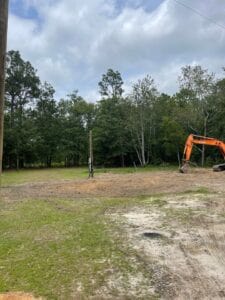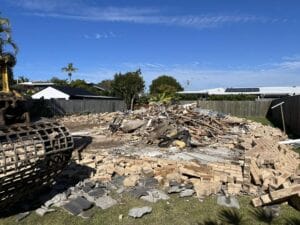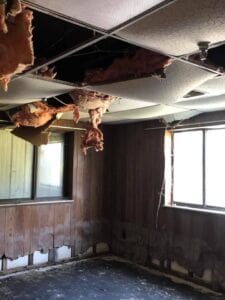Looking to demolish your mobile home? Wondering how to get started? Well, you’ve come to the right place! Whether it’s wear and tear, outdated design, or simply the need for a fresh start, there are various reasons why people choose to demolish their mobile homes. But what exactly does this process entail?

Mobile Home Demolition
In this brief guide, we’ll explore the ins and outs of demolishing a mobile home. From understanding the reasons behind demolition to uncovering its benefits, we’ll cover it all. You’ll also gain insights into the key considerations involved in this undertaking.
So, if you’re ready to bid farewell to your old mobile home and embrace something new, grab your hard hat and let’s dive into the world of mobile home demolition. Get ready for an exciting journey ahead!
Safety Standards and Codes for Mobile Home Demolition
Demolishing a mobile home may seem like a straightforward task, but it is crucial to prioritize safety throughout the process. Adhering to safety standards and familiarizing yourself with local codes and regulations ensures that the demolition is carried out in a secure and responsible manner. Proper disposal of hazardous materials according to safety guidelines is essential to protect both the environment and individuals involved in the demolition.
Importance of Adhering to Safety Standards During Demolition
When demolishing a mobile home, it is vital to prioritize safety at every step. By following established safety standards, you mitigate potential risks and prevent accidents or injuries. Safety measures such as wearing protective gear like gloves, goggles, and helmets can shield you from harm while handling heavy equipment or working in hazardous conditions.
Moreover, ensuring structural stability during the demolition process is crucial for avoiding unexpected collapses or accidents. Before starting any demolition work, it’s important to assess the condition of the mobile home thoroughly. Identifying weak points or areas prone to collapse allows you to plan your approach accordingly and take necessary precautions.
Familiarizing With Local Codes and Regulations: Mobile Home Demolition
Each locality may have specific codes and regulations regarding mobile home demolition. Familiarizing yourself with these guidelines helps ensure compliance with legal requirements while carrying out the demolition project. These codes often address various aspects such as permits, environmental considerations, disposal methods for different materials, noise restrictions, and more.
To begin, contact your local building department or relevant authorities to obtain information about specific codes applicable in your area. They can provide guidance on obtaining necessary permits and inform you about any additional requirements unique to your location. By adhering to these regulations from the outset, you avoid potential legal issues that may arise if proper procedures are not followed.
Ensuring Proper Disposal of Hazardous Materials According to Safety Guidelines
Mobile homes often contain hazardous materials that require careful handling during demolition. These materials can include asbestos, lead paint, and other toxic substances that pose health risks if not disposed of properly. It is crucial to follow safety guidelines for the removal and disposal of these hazardous materials to protect both yourself and the environment.
Here are some key steps to ensure proper disposal:
-
Identification: Conduct a thorough inspection of the mobile home to identify any hazardous materials present. This may require professional assistance or testing in the case of asbestos or lead-based paint.
-
Containment: Safely isolate and contain hazardous materials, ensuring they do not contaminate surrounding areas during the demolition process.
-
Removal: Engage certified professionals equipped with the necessary expertise and equipment to remove hazardous materials safely. They will follow established protocols for containment, packaging, and transportation.
-
Disposal: Dispose of hazardous materials at authorized facilities that specialize in handling such waste. These facilities adhere to strict regulations for safe disposal, preventing harm to individuals and the environment.
By following these guidelines, you ensure that all hazardous materials are dealt with responsibly throughout the demolition process.
Step-by-Step Guide to Demolishing a Mobile Home
Preparing the site and obtaining necessary permits before starting demolition
Before you begin demolishing your mobile home, it’s crucial to prepare the site properly and obtain any necessary permits. This ensures that you comply with local regulations and avoid any legal issues. Here are the steps you should follow:
-
Research local regulations: Start by researching the specific requirements for demolishing a mobile home in your area. Check with your local building department or zoning office to understand any restrictions or guidelines.
-
Obtain necessary permits: Once you have a clear understanding of the regulations, apply for the required permits. This typically involves submitting an application along with relevant documents such as property ownership proof and demolition plans.
-
Notify utility companies: Before starting demolition, contact all utility companies (electricity, water, gas) to disconnect services safely. This step is essential for ensuring safety during the demolition process.
-
Clear the site: Remove any obstacles or debris around the mobile home to create a clear workspace. This includes trimming trees, removing vegetation, and relocating any vehicles or equipment that may hinder the demolition process.
Disconnecting utilities and removing personal belongings from the mobile home
Once you have obtained the necessary permits and prepared the site, it’s time to focus on disconnecting utilities and removing personal belongings from inside the mobile home:
-
Turn off utilities: Begin by shutting off all utilities connected to the mobile home, including electricity, water supply, and gas lines. It’s crucial to follow proper procedures to prevent accidents during disconnection.
-
Remove personal belongings: Before demolishing your mobile home, take out all personal belongings such as furniture, appliances, fixtures, and sentimental items. Carefully pack them away or move them to a safe location.
-
Salvage reusable materials: Consider salvaging materials like doors, windows, cabinets, or fixtures that can be reused or sold. This not only reduces waste but also provides an opportunity to recoup some of the demolition costs.
Techniques for dismantling or deconstructing the structure safely and efficiently

Once you have completed the initial preparations, it’s time to focus on the actual demolition process. Here are some techniques you can use to dismantle or deconstruct your mobile home safely and efficiently:
Start from the top: Begin by removing any roofing materials, such as shingles or metal sheets. This allows easier access to the interior and facilitates further dismantling.
Work in sections: Divide the mobile home into manageable sections, typically by cutting along its frame lines. This helps maintain stability during the demolition process and makes it easier to handle individual pieces.
Use appropriate tools: Depending on the construction materials of your mobile home, you may need different tools for demolition. Common equipment includes reciprocating saws, pry bars, hammers, and power tools like angle grinders.
Dispose of debris responsibly: As you demolish each section, ensure proper disposal of debris according to local regulations. Separate recyclable materials like metal or wood from non-recyclable waste and arrange for their appropriate disposal.
By following these step-by-step instructions, you can successfully demolish a mobile home while adhering to legal requirements and ensuring safety throughout the process. Remember to consult professionals if needed and always prioritize precautionary measures for a smooth demolition experience.
Factors Affecting the Cost of Mobile Home Demolition
There are several factors that can impact the overall cost. Let’s take a closer look at these factors and how they can influence the price of mobile home demolition.
Size, Age, and Condition of the Mobile Home
The size, age, and condition of the mobile home play a significant role in determining the cost of demolition. Larger mobile homes generally require more time and resources to demolish, resulting in higher costs. Similarly, older mobile homes may have structural issues or outdated materials that make demolition more complex and costly.
Furthermore, the condition of the mobile home can affect the ease with which it can be demolished. If a mobile home is dilapidated or has suffered extensive damage from natural disasters or neglect, additional precautions may need to be taken during demolition. This could involve reinforcing structures or carefully dismantling certain components, leading to increased costs.

Additional Expenses Related to Asbestos Removal or Environmental Assessments
In some cases, asbestos may be present in older mobile homes. Asbestos was commonly used in construction materials before its health risks were fully understood. Therefore, if your mobile home contains asbestos-containing materials (ACMs), you will need to hire professionals for safe removal before demolition can proceed.
Environmental assessments are another potential expense that can arise during mobile home demolition. These assessments ensure that any hazardous substances on-site are properly identified and disposed of according to local regulations. The presence of contaminants such as lead-based paint or underground fuel tanks can significantly impact both timeframes and costs associated with demolition.
Considering Salvageable Materials That Could Offset Some Demolition Costs
While demolishing a mobile home typically involves tearing down most if not all of its components, there may be salvageable materials that could offset some of the costs. These salvageable items can include:
Appliances: Functional appliances like refrigerators, stoves, or air conditioning units can be sold or reused.
Fixtures: Light fixtures, faucets, and other bathroom or kitchen fittings may still have value.
Building materials: Wood, metal, and even certain types of insulation can be salvaged and repurposed.
By carefully assessing the mobile home before demolition, you can identify any salvageable materials that could potentially be sold or reused. This not only helps reduce the overall cost but also promotes sustainability by minimizing waste.
Hiring a Mobile Home Demolition Contractor in Your Area
Hiring a professional demolition contractor is crucial. These experts have the knowledge, experience, and equipment needed to safely and efficiently bring down your mobile home. However, finding the right contractor for the job can be a daunting task. Here are some essential steps to help you hire a reputable mobile home demolition contractor in your area.
Researching Reputable Contractors Experienced in Mobile Home Demolition
Start by researching reputable contractors who specialize in mobile home demolition. Look for companies that have extensive experience in this specific field to ensure they understand the unique challenges involved. Check online directories or ask for recommendations from friends, family, or local authorities.
Once you’ve compiled a list of potential contractors, dig deeper into their background and expertise. Visit their websites or social media pages to learn more about their services and previous projects. Look for testimonials or case studies that showcase their successful demolitions of mobile homes.
Obtaining Multiple Quotes to Compare Pricing and Services Offered
To make an informed decision, it’s crucial to obtain multiple quotes from different contractors. This allows you to compare pricing and the services each contractor offers. Reach out to at least three contractors on your list and request detailed quotes.
Ask them to break down the costs involved in demolishing your mobile home, including any additional fees such as permits or disposal charges. A transparent breakdown will help you evaluate which contractor provides the best value for your money.
Verifying Licenses, Insurance Coverage, and Customer Reviews Before Hiring
Before finalizing your decision, verify that the contractor holds all necessary licenses required by your county or area. You can contact the local licensing agent or check online databases for confirmation.
Ensure that the contractor carries adequate insurance coverage for liability and worker’s compensation. This protects you from any potential accidents or damages during the demolition process.
Customer reviews also play a vital role in assessing the contractor’s reputation. Look for online reviews and ratings on reputable platforms to gauge their past clients’ satisfaction levels. Pay attention to any recurring positive or negative feedback, as it can provide valuable insights into the contractor’s professionalism and reliability.
By following these steps, you can hire a professional mobile home demolition contractor in your area with confidence. Remember to thoroughly research each candidate, obtain multiple quotes, and verify licenses, insurance coverage, and customer reviews. With the right contractor by your side, demolishing your mobile home will be a smooth and hassle-free process.
Regulations and Laws for Mobile Home Demolition
Understanding Local Zoning Laws Regarding Mobile Home Removal
Before embarking on the demolition of a mobile home, it is crucial to familiarize yourself with the local zoning laws that govern such activities. Zoning regulations can vary from one area to another, so it’s essential to research and understand the specific requirements in your locality. These regulations may dictate where and how you can demolish a mobile home, as well as any necessary permits or licensing.
To ensure compliance with local zoning laws, consider the following:
Contact your local planning department: Reach out to your local planning department or building authority to inquire about the specific regulations related to mobile home demolition. They can provide valuable information on permits required and any restrictions in place.
Obtain necessary permits: Depending on your location, you may need to obtain permits before demolishing a mobile home. These permits typically involve paying a fee and submitting relevant documentation outlining your plans for demolition. Failure to secure these permits could result in legal consequences.
Consult with professionals: If you’re unsure about navigating through the complex web of zoning laws, consider consulting with professionals who specialize in demolition projects. They can guide you through the process and ensure compliance with all applicable regulations.
Compliance With Environmental Regulations When Disposing of Waste Materials
When demolishing a mobile home, it’s crucial to handle waste materials responsibly and comply with environmental regulations. Improper disposal of hazardous substances can harm both human health and the environment. Here are some key points to keep in mind:
Identify hazardous materials: Before starting the demolition process, identify any hazardous materials present within the mobile home. Common examples include asbestos-containing materials (ACMs), lead-based paint, or other toxic substances that require special handling.
Engage licensed professionals: To safely remove hazardous materials during demolition, it is advisable to engage licensed professionals experienced in handling such substances. They will follow proper protocols for containment, removal, and disposal.
Proper waste disposal: Dispose of all non-hazardous materials responsibly. This may involve separating recyclable materials from general waste and arranging for appropriate recycling or landfill services. Adhering to local waste management guidelines is crucial to avoid potential fines or penalties.
Potential Restrictions on Demolishing Certain Types of Mobile Homes

It’s important to note that there may be specific restrictions on demolishing certain types of mobile homes. These restrictions could be based on factors such as historical significance, architectural design, or cultural heritage. Here are a few considerations:
Historic preservation: Some mobile homes may hold historical significance within a community. In such cases, local authorities might impose restrictions on their demolition to preserve the area’s heritage. Research whether your mobile home falls under any historic preservation regulations before proceeding with demolition.
Architectural review boards: Certain neighborhoods or communities have architectural review boards in place to maintain consistency in design aesthetics. These boards may require approval before demolishing a mobile home that doesn’t meet their architectural standards.
Community covenants: If you reside in a neighborhood governed by community covenants or homeowner associations (HOAs), there might be specific rules regarding demolition and new construction projects. Review these covenants carefully to ensure compliance.
By understanding the local zoning laws, complying with environmental regulations, and considering potential restrictions, you can navigate the process of demolishing a mobile home smoothly while avoiding legal complications.
Recycling and Disposal Options for Mobile Home Materials
Identifying recyclable materials such as metal, wood, or appliances within the structure
During the demolition of a mobile home, it is essential to identify and separate recyclable materials from non-recyclable waste. By doing so, you can contribute to environmental sustainability and reduce the amount of material sent to landfills. Here are some key materials commonly found in mobile homes that can be recycled:
Metal: Mobile homes often contain a significant amount of metal components such as steel frames, aluminum siding, and copper wiring. These metals can be recycled and repurposed for various applications.
Wood: The structural elements of a mobile home, including walls, floors, and cabinets, are typically made of wood. Salvaging and recycling this wood can have multiple benefits such as reducing deforestation and providing raw material for new construction projects or furniture production.
Appliances: Mobile homes usually have appliances like refrigerators, stoves, and air conditioners. These items may contain valuable metals like steel or copper that can be extracted through recycling processes.
By identifying these recyclable materials within the structure of a mobile home before demolition begins, you can ensure they are properly handled for recycling rather than being discarded as waste.
Proper Disposal Methods For Non-Recyclable Waste Generated During Demolition
While it is important to prioritize recycling whenever possible during the demolition process, there will inevitably be some non-recyclable waste that needs proper disposal. Here are some recommended methods for disposing of such waste:
Landfill: Non-recyclable materials that cannot be salvaged or repurposed should be taken to authorized landfills designated for construction debris.
Waste Management Services: Hiring professional waste management services ensures that all non-recyclable waste is collected and disposed of according to local regulations.
Separation: It is crucial to separate hazardous materials, such as asbestos or lead-based paint, from other waste. These substances require specialized handling and disposal procedures to prevent environmental contamination.
By following these disposal methods, you can ensure that non-recyclable waste generated during the demolition of a mobile home is managed responsibly and in compliance with environmental regulations.
Utilizing specialized recycling facilities or landfills that accept demolished mobile homes
It is important to find appropriate facilities that accept such waste. Here are some options for utilizing specialized recycling facilities or landfills:
Mobile Home Recycling Centers: Some regions have dedicated recycling centers specifically designed to handle materials from demolished mobile homes. These facilities have the expertise and equipment necessary for efficient processing.
Construction and Demolition (C&D) Landfills: Certain landfills specialize in accepting construction debris, including materials from mobile homes. These C&D landfills have proper infrastructure for managing large volumes of waste.
By utilizing these specialized facilities, you can ensure that the recyclable materials are processed correctly and that non-recyclable waste is disposed of appropriately.
Conclusion: Mobile Home Demolition
Successfully demolishing a mobile home requires careful consideration of safety standards and codes, following a step-by-step guide, understanding the factors affecting cost, hiring a professional contractor, being aware of regulations and laws, and exploring recycling and disposal options for materials. By adhering to these guidelines, you can ensure a smooth demolition process while minimizing risks and expenses.
Now that you have learned about the key aspects of mobile home demolition, it’s time to take action. If you are planning to demolish your mobile home, remember to prioritize safety by familiarizing yourself with local safety standards and codes. Following a step-by-step guide will help you navigate through the process efficiently.
Consider the various factors that can affect the cost of demolition, such as permits, site preparation, equipment rental, and waste disposal. By understanding these elements upfront, you can budget accordingly.
It is essential to do thorough research. Look for reputable professionals who have experience in this field and positive reviews from previous clients. Don’t hesitate to ask for references or examples of their work before making a decision.
Make Sure of Laws and Regulations: This is Important
Make sure you are aware of any regulations or laws specific to your location regarding mobile home demolition. Complying with these legal requirements will help avoid unnecessary complications during the process.
Finally, consider recycling or disposing of the materials from your demolished mobile home responsibly. Explore options such as salvaging reusable items or contacting local recycling centers for guidance on proper disposal methods.
By following these recommendations and taking into account all necessary considerations throughout the process, you can successfully demolish your mobile home while ensuring safety and efficiency.
You might also like our article:
Ways to Get Rid of an Old Mobile Home
FAQs: Mobile Home Demolition
Q: Can I demolish my mobile home by myself?
A: While it may be possible for some individuals with relevant experience or skills to tackle the demolition themselves, it is generally recommended to hire a professional contractor due to safety concerns and potential legal requirements.
Q: How long does it typically take to demolish a mobile home?
A: The duration of the demolition process can vary depending on factors such as the size of the mobile home, site conditions, and any additional requirements. It is best to consult with a professional contractor to get an accurate estimate.
Q: Are there any environmental regulations I need to be aware of when demolishing a mobile home?
A: Yes, there may be specific environmental regulations that govern the disposal of certain materials or require proper handling of hazardous substances. It is important to research and comply with these regulations to avoid potential fines or legal issues.
Q: Can I salvage any materials from my demolished mobile home?
A: Yes, many components of a mobile home can be salvaged and reused or recycled. Items such as appliances, fixtures, doors, windows, and even structural elements can often find new life in other projects.
Q: How much does it cost to hire a professional mobile home demolition contractor?
A: The cost of hiring a professional contractor for mobile home demolition can vary depending on factors such as location, size of the structure, complexity of the project, and additional services required. It is recommended to obtain multiple quotes from reputable contractors to compare prices and services offered.
Q: Are there any permits required for demolishing a mobile home?
A: Yes, in most cases you will need to obtain permits before demolishing a mobile home. These permits ensure that the demolition process meets safety standards and local regulations. Check with your local building department for specific permit requirements in your area.
Q: What are some alternatives to traditional disposal methods for demolished mobile home materials?
A: Recycling is an excellent option for many materials from your demolished mobile home. You may consider donating usable items to charitable organizations or selling them online through platforms like classified ads or social media groups.
Q: Can I repurpose my land after demolishing a mobile home?
A: Absolutely! Once your mobile home has been demolished, you have the opportunity to repurpose the land for various purposes. You can consider building a new structure, creating a garden or outdoor living space, or even selling the land if desired.
Q: How do I find a reputable mobile home demolition contractor in my area?
A: To find a reputable contractor, start by asking for recommendations from friends, family, or neighbors who may have undergone similar projects.
You might also be interested in our articles:
